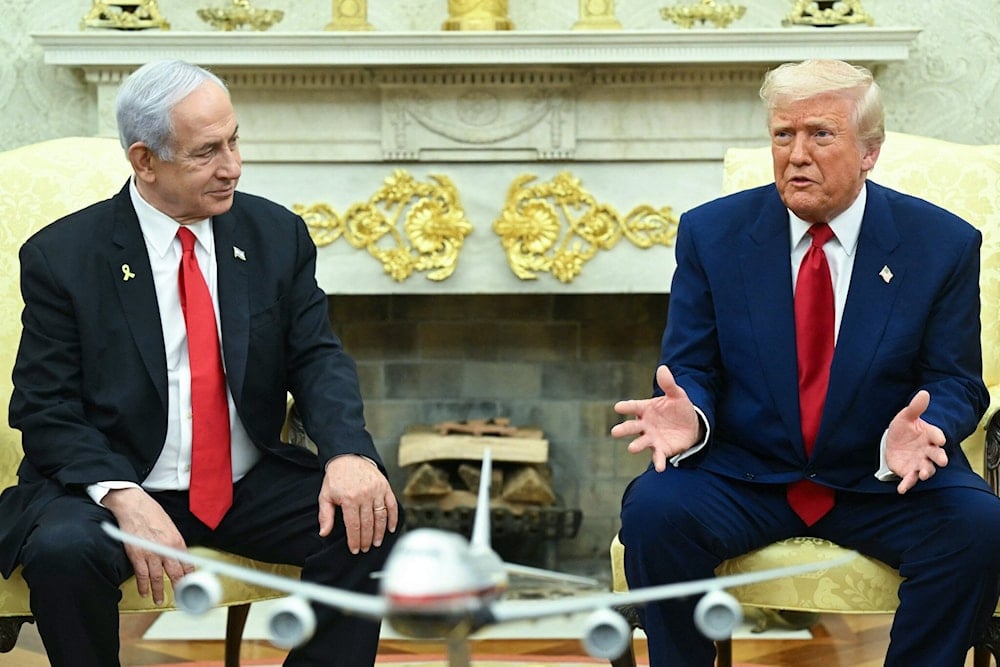Trump: 'Israel' would lead Iran strike if nuclear talks fall apart
Trump suggests "Israel: would take the lead in a potential military strike on Iran if upcoming nuclear talks fail, emphasizing a two-month timeline for action.
-
 US President Donald Trump, right, meets with Israeli Prime Minister Benjamin Netanyahu in Washington, DC, on April 7, 2025. (AFP)
US President Donald Trump, right, meets with Israeli Prime Minister Benjamin Netanyahu in Washington, DC, on April 7, 2025. (AFP) - US President Donald Trump said Wednesday that "Israel" would take a leading role in a potential military strike on Iran along with the US if upcoming nuclear talks don’t succeed.
When reporters in the Oval Office pressed him on whether he would resort to military action against Iran if the country refused to agree to a nuclear deal, Trump replied, “If it requires military, we’re going to have military”.
“Israel will obviously be very much involved in that — it’ll be the leader of that,” he said, before correcting himself, “Nobody leads us. We do what we want to do”, representing the first time he explicitly threatens a srike by "Israel" during his presidential term.
Trump said the US would “absolutely” use military force against Iran if necessary and that he has a timeline in mind for how long this would take. According to some reports that have recently emerged, Trump is giving the process two months.
The last strike on Iranian soil by "Israel" took place in October 2024, "Israel's" attack came off as underwhelming, as the Iranian air defense succeeded in thwarting Israeli aggression on its soil. The attempted Israeli strikes on several bases across three provinces were met with medium-range air defense systems, rendering the Israeli attack, which was panned in Israeli media, a failure.
Nuclear talks - the Oman summit
Trump tore up a 2015 deal between Iran and six world powers — the US, Russia, China, France, Britain and Germany — during his first term of office in 2017, and also imposed stiff sanctions.
He described Saturday’s upcoming indirect talks in Oman as the “start” of the nuclear talks process, with US envoy Steve Witkoff and Iranian Foreign Minister Abbas Araghchi representing their respective countries. Trump emphasized direct talks, while Iran insisted on using a mediator.
Netanyahu answered that a good proposal would be similar to one that led to the dismantlement of Libya’s nuclear program, adding that time for diplomacy was limited, an Israeli source said.
“We have a little time, but we don’t have much time because we’re not going to let them have a nuclear weapon,” Trump said. “We’re going to let them thrive. I want them to thrive. I want Iran to be great. The only thing they can’t have is a nuclear weapon. They understand that.”, Trump said.
In an April 1 statement on the social media platform X, Iranian Foreign Minister Abbas Araghchi pointed out that Iran’s pledge under the nuclear deal, officially known as the Joint Comprehensive Plan of Action (JCPOA), remains in effect, and that "Iran reaffirms that under no circumstances will Iran ever seek, develop, or acquire any nuclear weapons", he said.
He further noted that, even a decade after the JCPOA’s signing and seven years after the US unilaterally exited the agreement, "there is not ONE SHRED OF PROOF that Iran has violated this commitment."
Iran and the United States will meet in Oman on Saturday for indirect high-level talks.
— Seyed Abbas Araghchi (@araghchi) April 7, 2025
It is as much an opportunity as it is a test. The ball is in America's court.
To further add pressure on Iran, the US Treasury Department on Wednesday issued new sanctions ahead of the Oman talks scheduled for this Saturday.
Netanyahu caught off guard
In an Israeli cabinet meeting Wednesday night, Netanyahu reportedly told ministers that "Israel" had advance knowledge of the US talks with Iran, with Washington having asked Tel Aviv what it would consider to be a good deal.
However, Israeli Cabinet Secretary Yossi Fuchs acknowledged that Netanyahu was caught off guard by Trump’s announcement of the direct talks this weekend, insisting that Netanyahu had known in advance about the planned US negotiations with Iran, but “he did not know the talks will take place on Saturday.”
“There is a close connection between the president and the prime minister. The president’s team competes over who loves Israel the most,” said Fuchs, according to The Times of Israel.
The Trump meeting contained more than one unwelcome surprise for Netanyahu, beyond the Iran talks, on the lack of immediate tariff relief, and on tensions with Turkey, with Trump praising its President Recep Tayyip Erdogan.

 4 Min Read
4 Min Read









